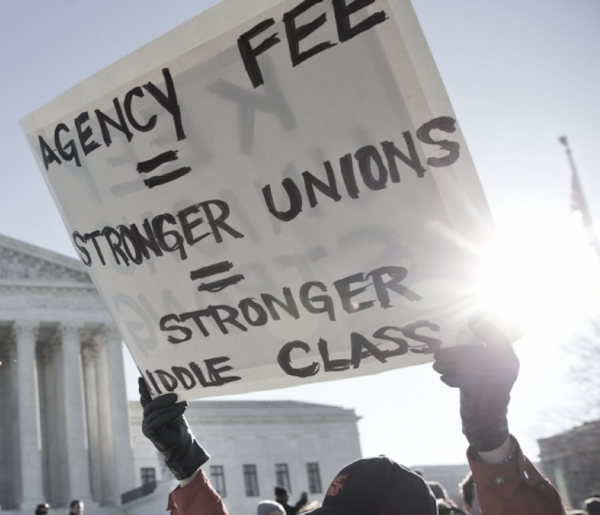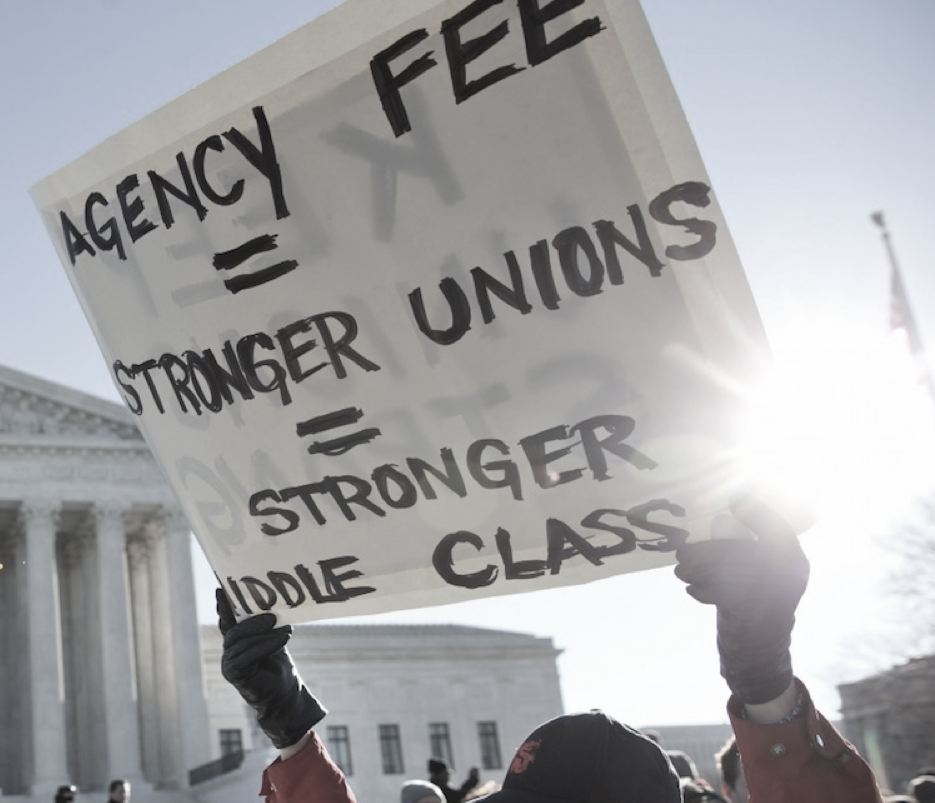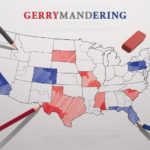
Image source: Rockefeller Institute
The Supreme Court has a blockbuster season of cases on the docket this term. The freshly whole court with a 5-4 conservative majority may very well put an end to the multibillion-dollar political machine that has been critical to Democratic political victories since the late 1970s. Mark Janus is a child welfare worker in Illinois who is seeking to end the requirement of “agency fees” as a condition of employment. The Supreme Court case pits Janus against the American Federation of State, County, and Municipal Employees or AFSCME; as of 2018 they have already expended over $4 million dollars in political donations and are the largest public sector union followed by teachers associations [1]. Agency fees are the mandatory amount that unions withhold from a member or non-member’s paycheck. About five million workers are currently forced to pay these fees as a condition of employment [2].
In 2004 the National Institute for Labor Relations Research estimated that $925 billion dollars were expended on political campaigns, which has pushed into the billions as of present. This decision will prove to be critical in the field of labor law, providing a legal check against the political and financial power of labor unions. Legal experts believe that Janus will prevail as this is the first official term of Neil Gorsuch, the newly appointed conservative justice to the court.
Since the 1970s with the expansion of laws that protected and expanded the powers of unions, they have been consistently shown to be Democratic supporters. Their political contributions have gone to almost exclusively liberal groups. Pro-business conservatives typically view unions as a force of unfair contention on business that makes operations more difficult. They argue that collective bargaining rights constantly advocating for pay increases under the threat of disruption put excessive pressure on businesses.
Others argue that they put large pressure on the municipal government as well. California has the highest state and local taxes in the nation which some posit is due to the constant concession of salary and benefit increases to union authorities [3]. The state is currently suffering from a growing pension insolvency crisis leaving large deficits that it is struggling to ameliorate. To put this in perspective, my grandfather’s retirement plan ran out years before his death and he was still given full payouts despite what he had put in. Effectively he made more as a retiree than he did in the labor force; if you want a successful pension system this should be impossible.
Pro-union liberals view unions as a necessary tool that levels the playing field between the working class citizen and the massive power of employers. Individuals normally do not possess the finances to retain a single lawyer, let alone battalions of lawyers, accountants, and many others that big businesses employ. The growing popularity of arbitration, which forces employees with legal grievances into private hearings with a private arbiter and a myriad of non-disclosure agreements, leaves workers with little recourse without the backing of unions. The vendetta here rests between pro-union and anti-union forces.
The principle question in the case is whether to repeal the Court’s previous ruling in upholding the agency fee rule in Abood v. Detroit Board of Education [4], in a rare reversal of court precedence. As it stands unions can collect fees from non-union members so long as the money is not used for political contributions (member and non-union members have to submit a letter of political objection). Unauthorized collection of employee fees has been a stable policy to avoid the “free rider” issue; this a phenomenon in which someone that does not pay union dues benefits from collective bargaining actions such as increases in salary, better benefits, bonuses, etc. Abood v. Detroit was a failed challenge to the agency fee, along with Friedrichs v. California [5]. Unions have been a frequent target of workers and politicians who believe that they do not justify the costs they levy on workers.
Ruling in favor of Janus (anti-union) would mean:
Unions can no longer collect fees from non-union members
Reduction in union membership
Reduction in union budgets
Massive blow to Democratic political strongholds nationwide
Ruling against Janus (pro-union) would mean:
Maintenance of high union membership
Continued withholding of non-member checks
Setting precedent for union power in conservative Supreme Court
Reinforced political power for Democrats
Unions are undoubtedly a vital part worker protection, but if legal representation is hardly ever needed then workers need not lose thousands of dollars a year. If the Court rules in favor of Janus this could create a nation of free riders and leave unions unjustly deprived of funds for hard-fought victories in the name of workers. Conversely, a ruling for the AFSCME would mean that many workers may be having their First Amendment rights subverted through mandatory dues payments. Though the court will have to provide specific guidance in their subsequent decisions and opinion, there is only one clear solution.
The Supreme Court should (and probably will) rule in favor of Mark Janus, ending the mandatory agency fee. This will allow workers and freedom of choice they deserve for themselves and their money. There should be a guidance provision in the prevailing opinion that dictates in the event individuals elect not to be union members then they will not receive retirement, health, salary, and other benefits that may be negotiated through the use of union legal personnel or protest efforts. This will assuage some of the mutual anxiety of both parties and allow liberty to take priority. There will undoubtedly be future litigation over the grounds of which a non-union member is entitled to union earned improvements in pay and benefits, but I hope the Justices will rely on the plain English language instead of the “legalese” that is common for attorneys and magistrates alike. In keeping with the first year of the presidency this first Supreme Court term is sure to be a spectacle.
Take Action:
https://www.nlrb.gov/news-outreach/graphs-data/petitions-and-elections/representation-petitions-rc – File a petition with the National Labor Relations Board to certify your very own union.
https://petitions.moveon.org/sign/save-our-labor-unions – Sign here to be a part of a direct submission to President Trump and Congress.
http://www.nrtw.org/petition-against-union-representation/ – Use this form to object to involuntary union membership within your profession.
https://petitions.signforgood.com/aflcio-workingrights – Voice your opinion to the Supreme Court regarding the case being discussed in this article.
References:
- “Public Sector Unions”, OpenSecrets.org, accessed February 11, 2018.
- “Mark Janus Supreme Court Brief”, Supremecourt.gov, accessed February 11, 2018.
- “What Janus v. AFSCME means for California”, The Orange County Register, accessed February 11, 2018.
- “Abood v. Detroit of Education”, wikipedia.org, accessed February 11, 2018.
- “Friedrichs v. California Teachers Association”, wikipedia.org, accessed February 11, 2018.




